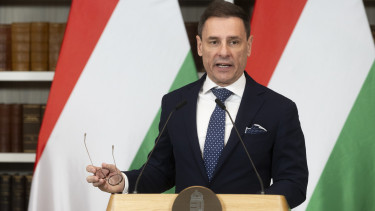Hungary plans no curfew, or shutting down cities or parts thereof

Border gridlock resolved
A 29-kilometre queue formed on the motorway in Austria towards the Hungarian border at Hegyeshalom, as Hungary shut its borders to foreign citizens. Romanian, Bulgarian and Ukrainian workers driving home from Austria blocked the road, trapping also Hungarians. As a result of negotiations, transit routes through the country were opened, although these are currently open only to Romanian and Bulgarian citizens. Talks are underway to include Serbians too, said Tibor Lakatos.
COVID-19 spreads across the nation
Cecília Müller said Hungary is now in a phase of group infections. The coronavirus may be present in any part of the country and its spread depends on various factors, including population density and distribution.
Every measure is aimed at minimising the spread of the epidemic, flattening the curve of the coronavirus, and avoid serious cases. Here's an excellent article explaining what "flattening the curve" means and how it can be done properly. And here's another one.

Müller stressed the vital importance of people staying indoors, isolating themselves from communities, although she specifically mentioned the need for the elderly to stay away from the streets and public transportation.
There are 58 confirmed COVID-19 cases from all over the country, she said. The latter information is new for
Hungary is the only country in the European Union that does not publish detailed information of the infections, i.e. we do not know where the new cases were found or if the patients are male or female, or how old they are. Previously, Müller argued that they keep such information under wraps because everyone's privacy must be respected and with these data the patients could be traced. (Errrr, no. Here's an example: A 48-year-old woman in Békéscsaba is one of the new cases. Good luck finding her!)
Müller said positive tests came back from every part of the country, but that's the closest we got to a geographical breakdown, not to mention the questions of sex and age of the new patients. Thus there is no way we can estimate where potential hotspots are. In the meantime, Poland has launched an interactive map where you can track the spread of the virus. Slovakia also has a map on COVID-19 cases, including not only the regions but even the cities affected. Slovenia updates its coronavirus case count according to age groups and regions. Romania publishes data on the affected regions, the sex and age of the infected people, and - listen to this - it also tells the public about contacts, i.e. that the newly diagnosed patients were infected by which previously detected case (only the number, e.g. sixth, 18th, etc.), whether they had previously been abroad and which country they returned from. Hungary no longer discloses even if a new patient is a man or a woman.
When asked again about the lack of a breakdown of COVID-19 cases, Müller reiterated her earlier argument (anonymity of patients) and said the data have no relevance for the public, but they are available for epidemiological experts. When asked why geographical breakdown is available for Lyme disease, she replied that it's for people to know which place in the country they should not visit.
No curfew is considered
Answering a question, Lakatos said "we do not plan to seal off parts of cities, settlements. There may be a time for such measure, but it will be preceded by extremely careful calculations, since we do not want to cause any more harm then necessary only to contain the spread of the virus."
How many respirators are available?
Hospitals submit reports in this respect every day. How many they have, how many of these are operational and how many are still available. There are currently 1,600 operational respirators, some of which are already in use, but some are still wrapped in plastic.
How many tests did Hungary order?
"A lot," replied Müller. There is a shortage of tests on the market, but orders are submitted continuously and we will obtain the necessary tests, she added. Later she reassuringly noted that "several deliveries" of face masks will be made this week, as the Chinese market is starting to breathe more freely again.
Well, that's a serious answer right there. And by none other than the country's Chief Medical Officer. "A lot." Wow. Seriously? Müller apparently thinks that she is talking to her child who's nagging her by asking "Are we there yet? When will we get there?" all the time, and she finally blurts out: "Soon!" No, that's not how you treat journalists and the public! Especially in this position, especially amidst arguably the biggest crisis since World War II.
How come Czech Prime Minister Andrej Babis was able to tweet on Sunday that his government plane will fly to Shenzhen, China, for 100,000 rapid coronavirus testers. He even said when the plane will take off and when it will return, and reassured the public that: “The testers are designed for rapid diagnostics in the case of people who show symptoms of a respiration disease and may be infected with new coronavirus. The test’s result is available in 29 minutes."
Earlier that day, Deputy PM and Interior Minister Jan Hamacek said his ministry has signed contracts on the supply of 1.1. million respirators and five million face masks from China and was negotiating with the Travel Service air carrier to bring the consignment to Czechia by Wednesday. That's how you share information with the public!
Will they open designated accommodation for medical staff?
We thank health care workers for their huge efforts. We trust that with the measures we have put in place we should not be concerned that medical staff will be infected en masse, but we are prepared to take care of them if necessary, said Lakatos.
Will the government do something against drastic price hikes?
There is no reason to think Hungary's supply is at risk. The shipment of goods and the replenishment of inventories is constant. Every truck filled with goods has reached their destination in Hungary. There will be consumer protection checks to find and prosecute those that hike their prices irrationally, said Lakatos.










